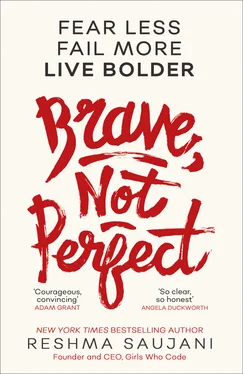The Overpowering Need to Please
Like most women, I was taught from an early age to be helpful, obedient, and care for other people’s needs, even to put them above my own. When my parents told me not to date until I was sixteen, I didn’t. When they said no makeup, or showing cleavage, or staying out past 10 p.m., I obeyed. I complied at all times with the behavior my family expected of me. In our Indian household, one greeted elders by touching their feet as a sign of respect; if I came home from school with a friend and found an older auntie there having tea, I would never dream of disrespecting my parents by not doing it, although I was mortified in front of my friend. At family dinners, my sister and I set and cleared the table, never questioning why our male cousins didn’t have to take a turn. Even though I would have much rather been outside playing with my friends, I always agreed to babysit my neighbor’s (bratty) kids. That’s just what helpful girls my age did.
Thus began my lifelong mission to be the perfect daughter, the perfect girlfriend, the perfect employee, the perfect mom. In this I know I’m not alone. We go from yes-girls to yes-women, caught in a never-ending cycle of constantly having to prove our worth to others—and to ourselves—by being selfless, accommodating, and agreeable.
A great example of how powerful the people-pleasing impulse can be comes from an experiment about lemonade. Yes, lemonade. ABC News, with the help of psychologist Campbell Leaper from the University of California, gave groups of boys and girls a glass of lemonade that was objectively awful (they added salt instead of sugar) and asked how they liked it. The boys immediately said, “Eeech . . . this tastes disgusting!” All the girls, however, politely drank it, even choked it down. Only when the researchers pushed and asked the girls why they hadn’t told them the lemonade was terrible did the girls admit that they hadn’t wanted to make the researchers feel bad.
The need to please people often shows up in the way girls scramble to give the “right” answer. Ask a girl her opinion on a topic and she’ll do a quick calculation. Should she say what the teacher/parent/friend/boy is looking for her to say, or should she reveal what she genuinely thinks and believes? It usually comes down to whichever she thinks will be more likely to secure approval or affection.
Girls are also far more likely than boys to say yes to requests even when they really want (and even need) to say no. Remember, being accommodating has been baked into their emotional DNA. When I ask girls what they do if a friend asks them to do her a favor they really don’t want or have time to do, nearly all say they would do it anyway. Why? Hallie, a freckle-faced fourteen-year-old, neatly summed it up with a “duh, that’s so obvious” shrug: “No one wants their friends to think she’s a bitch. I mean, no one .”
The internal pressure to say yes only gets stronger as we grow up. Like Dina, who works long hours as an attorney but somehow felt guilted into agreeing to be her son’s class parent. So many of us give our time, attention, maybe even money, to people or causes that are not a priority to us because we don’t want to hurt anyone’s feelings (mostly, though, because we don’t want them to think badly of us).
Boys, and the men they become, rarely feel this way. Janet, a forty-four-year-old manager at a clothing store, cringes anytime she reads an email that her husband, a general contractor, sends for work because she thinks his directness sounds harsh. He bluntly asks for what he needs or states his opinion, never softens critical feedback, and signs his emails without any salutations. No “best wishes” or even “thanks.” When she once suggested he soften the tone of an email to a vendor he worked with so as to not piss him off, he told her, “It’s not my job to be liked. It’s my job to get my point across.”
She, on the other hand, peppers her emails to her boss and coworkers with friendly lead-ins, praise, and, occasionally, a smiley face emoji. She reads over every email at least three times, editing and reediting it before she hits send. “My husband thinks I’m being neurotic when I do that,” Janet told me. “I think I’m being thorough. But if I’m being really honest, I’d say I’m being cautious so I don’t annoy or offend anyone.”
I work with an executive coach who tells me all the time that being liked is overrated. She does not say this to the über-successful male CEOs she coaches; she doesn’t have to. After all, their role models are men like Steve Jobs and Jeff Bezos who are notorious for not being people pleasers, so they don’t give a damn whether they’re liked or not.
Despite my coach’s urgings, I do worry about being liked. Running for office, especially in New York City, I built a pretty tough skin when it comes to public criticism. But on a day-to-day level, I care whether my team likes me. I care a lot. I want them to think I’m the most amazing boss they’ve ever had—which makes giving them critical feedback really hard. I do it, because I know I have to be the CEO, but ugh . In my personal life, I get completely twisted up inside if I have a disagreement with a friend or if I sense my parents or husband are upset with me. I’ve definitely spent nights worrying about how a colleague, an acquaintance—even a complete stranger!—may have interpreted something I’ve said, and I’ve soft-pedaled way too many times when I really should have ripped someone a new one.
Just yesterday a guy cut in front of me in line while I was buying a sandwich and even though I was pissed, I didn’t say a word because I didn’t want to be rude—and this was someone I didn’t even know and would likely never see again. And I too have been guilty of saying nice things even when I secretly think the exact opposite, so as to not offend (hello, salty lemonade). Haven’t we all?
The result of all this toxic people pleasing is that your whole life can quickly become about what others think, and very little about what you genuinely want, need, and believe—let alone what you deserve. We’ve become conditioned to compromise and shrink ourselves in order to be liked. The problem is, when you work so hard to get everyone to like you, you very often end up not liking yourself so much. But once you learn to be brave enough to stop worrying about pleasing everyone else and put yourself first (which you will!), that’s when you become the empowered author of your own life.
One sunny Saturday morning in late May, I sat on a bench in a playground in downtown Manhattan watching my husband, Nihal, and our then sixteen-month-old son, Shaan, play. Or, rather, I was watching my son bop from the monkey bars to the jungle gym and back again while Nihal stood a decent distance away and watched. Shaan’s shirt was smeared with strawberry ice cream and his nose was filled with boogers, but he didn’t care—and neither did I. Still new to the whole vertical coordination thing, Shaan toppled over a couple of times as he waddled from one end of the playground to another; each time, rather than run to his rescue, Nihal calmly waited for him to get up and keep going. At one point, I looked over and saw him coaxing Shaan, who was a little scared, down the big slide. “You can do this . . . you’re a big boy . . . you’re not afraid!”
Nearby, a few older boys were play-fighting using sticks as swords and chasing one another. Lots of happy hollering and a sea of dirty, scabby knees and elbows: a classic case of grade-school boys at play.
Meanwhile, over at the sandbox, five girls who looked to be around three years old were playing quietly. No ice-cream-smeared shirts or booger-encrusted noses there. Wearing cute coordinated outfits, they took turns scooping piles of sand to make a pretend cake, while their moms watched intently from a few feet away. In a ten-minute span, three of the five moms jumped up from their perches and climbed into the sandbox—one to straighten her daughter’s headband and another to reprimand her daughter for being “rude” by taking the shovel from another girl. The third mom rushed to her daughter’s aid after her sand “cake” fell over and hurriedly helped her daughter rebuild it while making soothing noises and wiping the tears from the girl’s face. When the cake was fixed, the little girl smiled and her mom beamed with pride, “There’s my happy girl!”
Читать дальше












